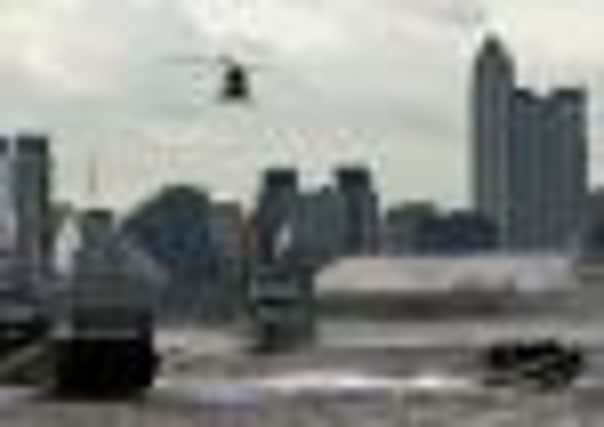Olympics security: Theresa May sends in the troops to plug gap


• Olympics security firm G4S unable find enough personnel for London Games
• Philip Hammond confirms 17,000 troops will be deployed in total
Advertisement
Hide AdAdvertisement
Hide AdHowever, Home Secretary Theresa May denied the process had become a shambles last night, with less than a fortnight to go before the opening
ceremony.
It was also confirmed that Olympic security will be the last operation for the Argyll and Sutherland Highlanders before the fifth battalion of the Royal Regiment of Scotland is slashed to just 100 soldiers specialising in ceremonial duties north of the Border.
Mrs May appeared before the Commons to make a statement yesterday, as MPs asked whether soldiers would be given bonus pay and time off to compensate for extra duties at the Olympics. Some of those involved recently arrived back from Afghanistan.
With more than £100 million wiped off the G4S’s market value and MPs accusing the company of letting the country down, Mrs May insisted ministers were only told of the “absolute gap in the numbers” on Wednesday.
Warning orders started going out to troops at the weekend, putting them on shortened notice to move.
But Mrs May denied it was a “shambles” and insisted there was “no question of Olympic
security being compromised”.
Asked whether there would be any financial penalties for G4S on its £284 million contract, Mrs May said the firm’s deal was with organiser Locog, but she understood that penalty clauses were included.
A total of 17,000 servicemen and women will now be involved in the Olympics, including 11,800 soldiers, 2,600 sailors and marines, and 2,600 airmen.
Advertisement
Hide AdAdvertisement
Hide AdSome 11,000 of these will be involved in the security of more than 30 sporting venues and 70 non-competition venues, including car parks and hotels, while others will carry out support roles including air security, search teams, communications and logistics, among others.
Overall, a 23,700-strong security force for the Games will include a mix of military, private security guards and at least 3,000 unpaid London 2012 volunteers.
Defence Secretary Philip Hammond acknowledged the extra burden on military families, but said bringing in extra resources was “prudent” and insisted the deployment “will have no adverse impact on other operations”.
“As the venue security exercise has got under way, concerns have arisen about the ability of G4S to deliver the required number of guards for all the venues within the timescales available,” Mr Hammond said.
“Ministers have been monitoring this situation and, where necessary, preparing contingency measures.
“G4S has now agreed that it would be prudent to deploy additional military support to provide greater reassurance.”
Keith Vaz, the Labour chairman of the Commons home affairs select committee, said: “G4S has let the country down and we have literally had to send in the troops.”
He asked G4S chief executive Nick Buckles and its chairman Alf Duch-Pedersen to appear before the committee next week to explain the problems.
Advertisement
Hide AdAdvertisement
Hide AdShadow home secretary Yvette Cooper added that the situation looked like “another Home Office shambles”, with G4S falling 25 per cent short of its contract.
The problems come on top of long queues at Heathrow airport and other issues with inexperienced border staff, Ms Cooper added.
She told Mrs May: “Please get these security problems and these border problems sorted out and stop letting everyone else down.”
Even as ministers were outlining the plans in the Commons, Surrey Police Authority suspended its part in a privatisation scheme which could have involved G4S.
Members raised concerns that potential police and crime commissioners were now campaigning to put a stop to business partnering.
G4S, the largest employer on the London Stock Exchange with more than 650,000 staff worldwide, admitted last night it was experiencing “some issues in relation to workforce supply and scheduling” and had accepted that the government was turning to the military for help.
A spokeswoman added: “This has been an unprecedented and very complex security recruitment, training and deployment exercise which has been carried out to a tight timescale.”
Its workforce will conduct physical searches, operate X-ray machines and carry out perimeter searches at the Games.
Advertisement
Hide AdAdvertisement
Hide AdRetired Colonel Richard Kemp, a former UK commander in Afghanistan, said the development would hit troops “very hard indeed”.
“We shouldn’t forget also that many of these soldiers are people who have been told in the last few days that they are going to be made redundant, that their regiments are being scrapped and they are under great pressure already,” he said.
“The wider morale in the forces now is very fragile and this will simply add to that fragility.”
Assistant commissioner Chris Allison, head of Scotland Yard’s security operation, has previously insisted the sporting event will be a “blue Games”, despite the presence of the military and surface-to-air missiles being positioned near the Olympic Park.